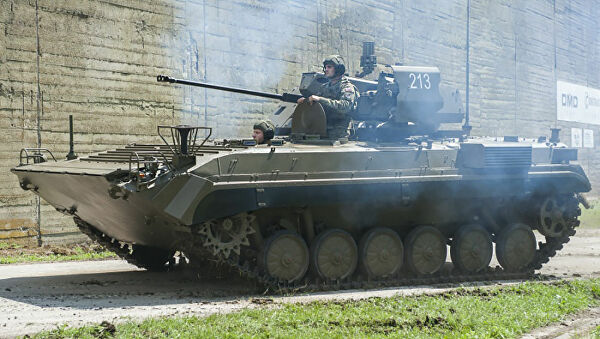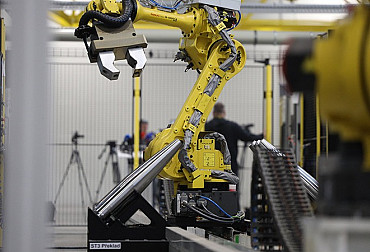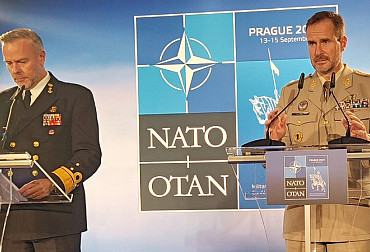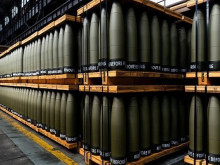In Slovakia, tests of tracked armored vehicles were carried out within the tender for new IFVs for the Slovak Armed Forces
The premises of the Military Technical and Testing Institute "Záhorie" recently hosted tests of selected parameters of tracked combat vehicles offered by foreign manufacturers to the Ministry of Defence within the framework of the project for the acquisition of new tracked personnel carriers.
 Picture: Tests of tracked armored vehicles in Slovakia as part of the tender for new IFV for the Slovak Armed Forces | Ministry of Defence of the Slovak Republic
Picture: Tests of tracked armored vehicles in Slovakia as part of the tender for new IFV for the Slovak Armed Forces | Ministry of Defence of the Slovak Republic
In accordance with the evaluation process so far, the three best offers took part in the tests, namely Hungary with the LYNX vehicle from Rheinmetall Landsysteme GmbH, the Kingdom of Spain with the ASCOD vehicle from GDELS Santa Bárbara Sistemas and the Kingdom of Sweden with the CV90 vehicle from BAE Systems Hägglunds AB.
The vehicles were subjected to firing and ergonomic tests, handling tests and technical parameters remeasurement tests according to the requirements of the Slovak Armed Forces with regard to the demonstration vehicles supplied.
Within the framework of the firing tests, different firing modes of the main armament of the combat vehicle at different distances and different types of static and moving targets were verified. The driving characteristics were tested in off-road and on-road driving, vehicle dynamics, manoeuvrability or overcoming various types of obstacles. Testing of vehicle ergonomic requirements focused on the ergonomics of the vehicle interior, noise, vibration and, last but not least, the fit of the carried armament and equipment.
The new tracked combat vehicles are intended to replace the equipment of mechanised units of the BVP-1, BVP-2 and BVP M types.
 Picture: Slovakia now has Soviet-built BVP-1, BVP-2 and BVP M machines in its arsenal | Ministry of Defence of the Slovak Republic
Picture: Slovakia now has Soviet-built BVP-1, BVP-2 and BVP M machines in its arsenal | Ministry of Defence of the Slovak Republic
The results of the trials will be incorporated into the upcoming feasibility study, which is planned to be published at the end of May 2022. Subsequently, in accordance with the established processes, a material will be submitted to the Government of the Slovak Republic with a recommendation of a specific Government offer to the MoD of the SR by 30 June 2022. The procurement process will be completed by signing a Government-to-Government contract, which is tentatively planned for the end of 2022.
Czech tender for new IFV still on hold
When bidders in the tender to supply 210 tracked IFVs to the Army were invited to submit final bids last May, two years after the tender was launched, and when the deadline was subsequently extended to early September, it was definitively clear to even the last optimists that no winner would be chosen and no contracts signed by the 2021 parliamentary elections. Throughout the year, there have been calls for the incumbent Government not to tie the hands of the next Government with its actions on this project. In November, the bids submitted were deemed not evaluable by the MoD's expert committee. Already in May 2021, the then chairwoman of the Defence Committee and today's Defence Minister Jana Černochová (ODS) said: 'If the contracts are not signed by Metnar in time, the new minister must be able to review the contract and possibly reschedule it.' This is exactly what is happening now. Let's take a look at what are the options for further action in one of the most watched military tenders in the history of the Czech Armed Forces.
1. Continuation of the tender under the current terms of reference, with higher costs and the risk of further delays
Invite bidders to complete/correct their existing final bids and complete the tender with a realistic timetable according to the parameters set definitively in spring 2019. I.e. assess and evaluate the bids, select the winner and conclude a triangle of contracts between the contractor and the Ministry, the Ministry and the integrator of Czech industry participation, which is the state enterprise VOP CZ, and the integrator and the contractor. The participation of the Czech industry should be at least 40% of the contract value.
It should be recalled that this requirement became somewhat unexpectedly the subject of a dispute between the Ministry of Industry and Trade led by Karel Havlíček (for ANO) and the Ministry of Defence at the beginning of 2021. In the context of the comment procedure, the MIT demanded the production of vehicles in the Czech Republic and a significantly higher share of domestic industry in the contract. In the end, the reminder was not formally settled in any way, and the Ministry of Defence de facto defended its set of requirements from the time of the tender announcement in spring 2019, in a situation where it was struggling to get back the CZK 10 and then CZK 5 billion that the Government had transferred to its budget reserve to meet the nonsensical demand of the communists and to get their support for the draft law on the state budget in return. The missing or delayed return of the funds became one of the arguments used to explain, apart from the consequences of the pandemic, other delays (the start of tests of functional samples was gradually postponed, the call for final bids was not sent to the bidders until the end of May, while the Defence Committee criticised the timetable presented by the Ministry for the finalisation of the contract as unrealistic already during March), which resulted in the final bids of the bidders arriving at the MoD only on 1st September, after two of them requested an extension of the original deadline of 1st July 2021.
The MIT's criticism of the tender was put in the context of a letter addressed to then Prime Minister Andrej Babis in December 2020 by Armin Papperger, president of German company Rheinmetall. Referring to the progress of a similar contract in Hungary (Hungary purchased 218 LYNX KF41 vehicles and 9 ARV 3 BUFFALO recovery vehicles, the bulk of which will be produced in the Hungarian factory in Zalaegerszeg in a joint venture between Rheinmetall and the Hungarian Government), he informed the Prime Minister about alternative options for the supply of tracked armored personnel carriers to the Czech Army.
In a similar vein, the company GDELS, offering the ASCOD 42 vehicle, also responded at the time and sent a letter to the Ministry of Industry and Trade, which the then Minister and Deputy Prime Minister Havlicek commented to CRo saying: "They wrote us quite a nice letter saying that they liked the idea and that they were ready to go into, let's say, industrial production mode as well."
And the alternative options for dealing with the purchase of tracked IFVs have been discussed on numerous occasions by many members of the House Committee on Defence, and the committee adopted a resolution as early as November 2020 stating that the project was significantly delayed, asking for a realistic timetable for the implementation of the purchase, and also calling on the MoD to present possible alternatives to the ongoing competition, including purchase by interGovernmental agreement.
Resumption of the suspended tender without modifying the requirements will certainly entail difficult price negotiations, because if the price ceiling of CZK 52 billion (the acquisition cost of 210 tracked IFVs, including VAT), set in a completely different economic situation seven years ago, was the limit last year and the bidders adjusted their bids to it, with the rising prices of all conceivable inputs, it is unrealistic to work with it in 2022. Hungary is the big winner in this regard due to its speed and efficiency of military acquisitions - it bought its vehicles with comparable accessories on time at the original price (coincidentally similar to the Czech asking price). If the Czech Army wants to insist on the original procurement in all respects, a significant increase in price will be unavoidable, and the longer it has to stand still in this respect, the worse the outcome will be.
2. Cancel the tender and call for a new tender with simpler/changed/reduced requirements
If the first option is problematic for a number of reasons, first of all because the long-criticised tender has proved to be overcombined to the extent that three leading global manufacturers of advanced military equipment failed to stand up to the Czech expert committee, and if further delays and problems are therefore imminent, the second option is to cancel the existing tender and re-advertise it with simpler requirements. In this respect, the crucial question would be what the terms of reference should look like. To the possible objection that starting the whole process from scratch would risk delaying and making the tender more expensive, in addition to the risk of litigation, which is undoubtedly true, it can be recalled that with the tender being launched in spring 2019, the ministry optimistically expected the outcome in summer or September 2019. After the preparatory phase, the tender can therefore theoretically be completed very quickly, if the original estimate was meant seriously.
At the same time, the price increase is already inevitable, whether the original tender is continued, or the purchase is re-tendered, or another solution is found. Bidders will no longer be bound by the bids submitted, which were not accepted by the MoD in November. There is no longer a possibility that the original tender according to the original specification, i.e. 210 tracked vehicles in seven variants, will be completed with a price ceiling of CZK 52 billion, and a solution will have to be sought.
Discussions will therefore focus on the scope of the contract: 210 tracked infantry fighting vehicles. The army pretends that this is the optimum number of vehicles. At the end of April 2021, on Twitter @ArmadaCR explained the number of 210 tracked Infantry Fighting Vehicles as follows, "We need to arm three mechanized battalions, each needing sixty vehicles in 7 modifications. We also need additional IFVs for the tank battalion, combat support units and training units. We have it well calculated, we have been working on it for years."
The seven variants are, in addition to the combat command, reconnaissance, engineer, recovery, medical and artillery reconnaissance. The opinion was repeatedly voiced that not all of these variants necessarily have to be on a tracked platform, and that replacing them with wheeled vehicles can both save considerable money and increase the participation of the domestic industry in the modernisation of the armament of the mechanised battalions of the 7th Brigade due to the fact that wheeled armored vehicles are already being developed and produced by the Czech defence industry.
The proponents of the original assignment argue that there is a clearly defined requirement of the Army. However, the seven variants do not provide all the capabilities that a heavy brigade task force must acquire. They do not include, for example, fully usable air defence assets in manoeuvre warfare (missing from the 2030 Concept of build-up of the Czech Army) or self-propelled 120mm mortars. The latter attracted attention in the summer of 2021 when information about the intended abandonment of their purchase (foreseen in the 2030 Concept of build-up of the Czech Army by 2025) and the preference for light assault vehicles for paratroopers was leaked to the press. The bottom line is that wheeled platforms will exist in the 7th Brigade's armament, and there is logical room for consideration of converting some of the originally tracked vehicles to wheeled chassis.
On the other hand, it would seem not very sensible to reduce the number of vehicles as such, with the idea that by postponing the purchase of some of them (as we have seen in the case of the acquisition of wheeled Pandur II IFVs) we will visually reduce the absolute amount spent now - because we will pay more in the future, or the army will have to deal improvisationally with the fact that it lacks a substantial part of the vehicles in its armament for a long time.
One of the drawbacks of the first two options for the way forward is that the Public Procurement Act does not suit the specific needs of military acquisitions and a certain proportion of the complications and complexity of the whole process so far can be attributed to it. Jana Černochová has already called for its change from her position as Chair of the Defence Committee, and the promise of change is an important part of the Government's programme statement in the defence sector: 'By 2023, we will submit an amendment to the Public Procurement Act to take into account the specifics of defence acquisitions.' By 2023, however, it is too late in terms of the largest defence procurement in the history of the independent Czech Republic to date, and the continuation of the competition, or the launch of a new competition, would take place under the existing - and therefore unsatisfactory - conditions.
3. Acquisition by interGovernmental agreement or by direct approach to the manufacturer
According to Minister Černochová, we could expose ourselves to arbitration in the event of a fundamental change in approach, and she decided to consult lawyers before deciding on the next course of action. "Now we would expose ourselves to arbitration if the Czech Republic suddenly changed its mind after all the companies had spent considerable resources," she said in an interview with Seznam Zprávy at the end of January this year. In order to professionally analyse the status of the contract for the new IFV, a contract for a legal assessment of the public contract "Tracked Infantry Fighting Vehicle and its modifications - purchase" was signed on 25 February between the Ministry of Defence and the law firm HAVEL & PARTNERS s.r.o. (the result of the assessment should already be available to the Ministry of Defence). Indeed, it is difficult to imagine that the unsuccessful bidders, after years of contacts from the pre-acquisition phase and now nearly three years of competition, would have gotten over their failure and loss of opportunity without protesting. On the contrary, it is to be expected that not until November 2021, when their 'homework' was deemed inadequate and unassessable, their patience and helpfulness in the competition has been severely tested, and a certain weariness can be sensed behind the façade of diplomatic statements.
The cancellation of the ongoing tender will not only devalue the work of "only" the bidders (just as the work of the fourth original bidder was de facto devalued in the spring of 2019, when the manufacturers were informed that the army did not want a baseless tower at any price), but also of all those who participated in the tender process from the Czech side.
Purchasing by interGovernmental agreement or by directly approaching the manufacturer (as recently in the case of the Caesar self-propelled guns), apart from the threat of arbitration against the Czech Republic, also carries the risk of a higher price at first sight. In the absence of an alternative, competitive solution on the table, a single selected supplier can more easily build up its own requirements in a way that, in sum, will not be advantageous for the Czech Republic at first sight (again, we can refer to the example of the Caesar guns, for which the jump in price last spring visibly surprised the ministry's representatives).
On the other hand, one cannot lose sight of what is at stake. If the words uttered many times about the fact that the combat capability of the 7th Mechanised Brigade is at stake are not empty words, the need to equip it with modern equipment far exceeds the possible complications, or rather the fear of complications cannot in any way override it. Thanks to the war in Ukraine, the worsened security situation clearly shows the need to have a well-equipped and modern army, including heavy tracked equipment, and despite all the qualities and capabilities that our 7th Mechanised Brigade possesses, one simply cannot shake the impression that with the obsolete BVP-2s and the difficult-to-maintain T-72M4 CZs, we would not be able to contribute too effectively to the allies if necessary.
There are voices among the Members of the Defence Committee calling for a solution as soon as possible, especially from the opposition. Coalition MPs are sympathetic to Defence Minister Černochová's cautious approach. Virtually no one questions the need to rearm the mechanised infantry of the 7th Brigade, and in a broader context also the tank battalion. The question is which path can lead to it more quickly and efficiently, and which, on the contrary, poses too high a risk of further delays and problems. An analysis of the status of the contract seems entirely appropriate. The subsequent decision on the way forward must be well-founded and unquestionable.
The advantage of issuing a new tender, or opting for the G2G/direct approach to the manufacturer, brings with it the opportunity to look again very carefully at the capabilities of each type in terms of the anticipated need for their capabilities over the next decades, especially in view of the likely need to take advantage of evolving weapon, sensor, communications and protection systems - which will bring with it demands on the carrying capacity of the underlying vehicle platform.
The cost risk argument, which grows with time, is valid. But it has been valid since 2019, when the tender was also originally intended to end. Continuing the tender according to the original brief does not seem likely; the situation is fundamentally different in 2019, let alone 2017 or 2015. The threats posed by the possible cancellation of the tender need to be ascertained; and ideally, the Army should be allowed to choose a specific type of vehicle, the choice explained, and the vehicles procured by G2G/direct approach to the manufacturer.
Which doesn't mean a blank check. Politicians need to be sure that the chosen solution is economically rational. The final shape of the state budget suggests something. The volume of the major contract envisaged a significant increase in the defence budget from the outset, and it is becoming a kind of ball and chain that is holding back other necessary projects. The postponements and delays that have led to the current situation have meant a lower rate of growth in the defence budget as a result. This is primarily the result of the inflexibility or inability of the MoD to respond to changing conditions. The rigidity with which the part of the Ministry responsible for the project insists on continuing with the original IFV project threatens to lead to further delays. The stalemate has allowed the Government to visually reduce the budget deficit, which undoubtedly has its value - but one cannot help feeling that the approximately CZK 5 billion deducted, which cannot be spent on tracked IFVs in 2022, could have been used in other ways. Assuming that a solution was prepared in time, which was, however, hindered by the unrealistic and yet non-alternative timetable for finalising the purchase of BMP; this situation must not be repeated.





















